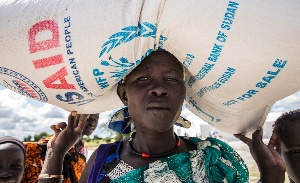Africa News of Wednesday, 2 April 2025
Source: www.ghanawebbers.com
Africa: USAID Funding Freeze Puts Millions of Women at Risk
**Women and Girls Face Severe Consequences from USAID Funding Freeze**
The freeze on USAID funding threatens thousands of aid programs for women. This limits frontline workers' ability to serve their communities. Established in 1961, USAID provides food, humanitarian aid, and economic development to impoverished countries. In many areas, its family planning program has been the main source of contraception and HIV treatment for decades.
On his first day in office, President Donald Trump made significant cuts to U.S. foreign aid. He and billionaire Elon Musk aimed to reduce government spending, claiming taxpayer funds were misused. These actions have caused chaos in global humanitarian relief efforts.
The suspension of foreign aid severely impacts reproductive healthcare for vulnerable populations. Refugees and those in conflict zones rely on foreign-funded clinics for essential services like prenatal care and emergency obstetric services. The sudden loss of funding has forced clinics to close and halted medical supply deliveries. This jeopardizes millions of lives.
In Uganda, malaria prevention efforts for pregnant women have stopped completely. In Zambia, medications that prevent hemorrhaging during pregnancy remain unused in storage. In South Africa, a clinical trial participant lost access to vital HIV care, highlighting serious breaches of reproductive health protections.
These actions represent a significant attack on reproductive rights worldwide. The funding freeze affects nearly 40% of global aid aimed at promoting sexual health and gender equality. Without these services, maternal mortality rates and unintended pregnancies are expected to rise sharply.
**Impact of USAID's Disappearance**
Without USAID funds, programs improving women's sexual health will suffer greatly. Experts predict 4.2 million unintended pregnancies and over 8,300 maternal deaths within three months among











